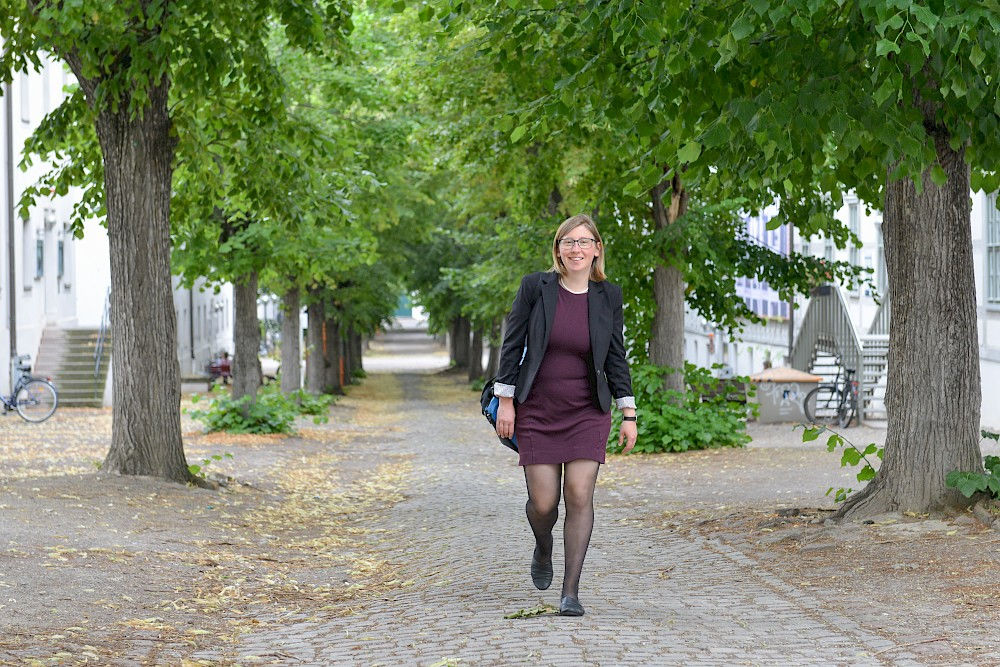“Inclusion is not egalitarianism”

Inclusion is a topic that really gets Ulrike Witten talking. You can tell that it is important to her. Since 2014 it has been the focus of her research in the Faculty of Theology. “Inclusion is highly relevant for society,” says the native of Leipzig. Therefore, she finds it particularly frustrating that the topic often is presented in abbreviated form in public discussions. “It’s counterproductive,” she says.
A fine distinction should first be made: Inclusion is not egalitarianism. Instead, it focuses on equal participation. For a long time, it has been about more than just including people with disabilities, but about inclusion in all areas of society, like taking into consideration someone’s background, level of education, age and much more.
It goes without saying that there are differences between people. However, “there are also unjust differences,” says the 38-year-old. For example, it has long been scientifically proven that access to a secondary school in Germany is determined, not by academic performance, but by origin. “That is not okay. Inclusion can address this.”
In order to create long-term change, it is important to take a closer look at inclusion and its development from a scientific perspective. During her post-doc studies, Ulrike Witten examined it at length with respect to religious education studies. She traced the context in which it arose and examined contradictions. And she pursued the question of how the term can be understood in the context of religious education studies. “I felt it was important to understand inclusion not only as a topic for religious education but also as a fundamental motivation for societal reform. That means finding out where there are unjust inequalities that need to be addressed,” she explains. This includes the question of whether non-denominational students should similarly participate in religious education like Christian students. She examined 15 different concepts of inclusion in religious education studies and analysed how they can impact religious education studies and where their limits lie.
Society’s heterogeneity is particularly evident in the area of religious education; many students now grow up in homes where Christianity plays no or only a very minor role, or they practice a different faith. “Reli-gious education teachers must be prepared for this reality,” says Witten, because only then can they react appropriately later on in their careers. The point is to provide religious education against the backdrop of this diversity. “A lot can be achieved if we are able to successfully invoke an awareness for this when training religious education students,” she says.
A further problem is the fact that teaching and research in the field of religious education studies is generally very strongly oriented towards grammar school education. “That is a limited view,” says Witten. The pressure is particularly high in secondary schools because it is precisely those pupils who often come from socially disadvantaged families or are children of migrants that often have a different religious background.
This is another reason why the 38-year-old believes the time has come for inclusion to be underpinned more and more by didactic methods. In other words, all academic subjects must consider the consequences and conclusions for their own academic discipline during teacher training.
Before Witten decided to become a researcher, she herself stood in front of a school class as a teacher. From 2010 to 2012 she completed her student traineeship at the Herder grammar school in Halle. At the time she was already the mother of a small son. In 2013 she defended her doctoral thesis. A short time later she gave birth to her second child and began teaching at Elisabeth Gymnasium, a Catholic grammar school in Halle. “I loved going chronologically through the school year with the students. I sometimes miss that now,” she says. Because, she says, you’re more of a lone wolf in the world of research.
But she does not regret taking the path she has taken. According to her, the contact she has to the many interesting colleagues whom she runs into every day at the university is priceless. “The diversity and coexistence of the different subjects” is something she particularly likes. “You will always get a profound answer from whomever you pose the question to,” says the researcher, who has also been the Equal Opportunities Officer in the Faculty of Theology since 2016.
By its very nature, she says, the office is closely linked to inclusion because it is about promoting those who are underrepresented. And in science, unfortunately, they are still often women. Ulrike Witten calls it “inconceivable” that, in March 2020, she was still only the first woman ever to do a post-doc degree in the Faculty of Theology. “However,” she adds, “I am just one of a new group of young female scientists for whom the ground has been prepared by earlier generations of women.” This is encouraging. She herself has received a great deal of support along the way, for example through a mentoring program that was designed to reduce the still too high exit ratio of women who have completed their PhDs. Such support tools are more than desirable, says Ulrike Witten.
PD Dr Ulrike Witten
Institute of Practical Theology and Religious Education
Telephone +49 345 55-23043
Mail: ulrike.witten@theologie.uni-halle.de
